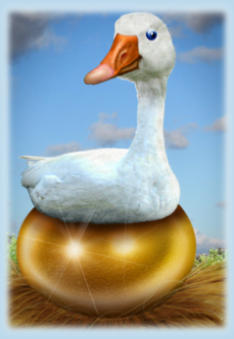
“For whoever wishes to save his life shall lose it; but whoever loses his
life for My sake shall find it” (Matthew 16:25).
“Killing the Goose”
The
story
of
the
goose
that
laid
the
golden
egg
might
well
be
the
best-
known
of
Aesop’s
Fables.
In
fact,
it
is
so
popular
and
commends
itself
to
the
mind
with
such
reasonable
wisdom
that
it
has
given
rise
to
the
idiom,
“killing
the
goose
that
laid
the
golden
egg.”
Everyone
seems
to
recognize
immediately
the
imminently
practical value of its moral.
The
tale
relates
how
a
farmer
found
that
his
goose
laid
a
golden
egg
every
day.
He
took
these
eggs
to
the
market
and
was
soon
becoming
rich
by
them.
However,
it
was
not
long
before
he
became
impatient
that
the
goose
was
laying
only
one
egg
a
day.
He
felt
that
he
was
not
getting
rich
fast
enough.
Indeed,
this
feeling
grew
to
consume
his
mind.
He
soon
became
so
greedy
that
he
started
to
think
of
ways
to
make
the
goose
lay
eggs
faster,
but
even
when
he
fed
the
goose
all
of
the
finest
grain
it
could
eat,
it
only
laid
for
him
just
one
egg
a
day.
In
his
frustration,
the
thought
occurred
to
him
that
inside
the
goose
lay
all
the
eggs
she
had.
If
only
he
killed
her
and
cut
her
open,
he
could
have
all
her
eggs
at
once
and
become
an
immensely
wealthy
man.
This
idea
so
seized
him
that
he
determined
to
carry
it
out.
So,
he
took
a
knife
and
slit
the
goose’s
throat
and
cut
open
her
body.
Yet,
not
even
his
most
thorough
search
revealed
a
single
golden
egg,
and
now,
even
the
goose
was
dead,
never
again
to
lay
another golden egg.
The
moral
is
obvious
and
commends
itself
to
common
sense:
greed
and
discontentment
can
so
overwhelm
the
heart
that
they
drive
people
to
foolish
acts
which
cause
them,
not
only
the
loss
of
the
wealth
they
already
enjoy,
but
deprive
them
of
any
further
hope
of
more.
The
lust for everything leaves them lacking everything.
Lying
at
the
center
of
this
story
is
a
principle
often
called
“delayed
gratification.”
It
counsels
deferring
immediate
satisfaction
of
desires
in
order
to
enjoy a better satisfaction later.
This
idea
also
lies
at
the
very
heart
of
the
gospel.
Indeed,
the
story
of
the
goose
that
laid
the
golden
eggs
illustrates
it
well.
Worldly
people
have
the
sense
that
their
lives
are
to
be
spent
in
getting
the
most
out
of
them
as
fast
as
they
can
to
satisfy
their
physical
desires
and
pleasures.
To
them,
this
is
the
totality
and
meaning
of
life.
This
is
its
purpose.
This
is
why
they
live.
So,
they
use
up
their
lives
for
the
momentary
pleasures
they
can
get
out
of
them,
while
they
should
be
using
them
to
create
a
greater,
eternal
treasure
for
themselves.
It
was
said
of
Moses
that
he
chose
“to
endure
ill-treatment
with
the
people
of
God,
than
to
enjoy
the
passing
pleasures
of
sin;
considering
the
reproach
of
Christ
greater
riches
than
the
treasures
of
Egypt;
for
he
was
looking
to
the
reward”
(Heb.
11:24-26).
People
need
to
use
the
assets
with
which
God
created
them
to
gain
the
salvation
of
their
souls,
which
is
the
only
asset
ultimately
worth
having.
Yet,
the
discontentment
with
what
they
have
makes
them
greedy
and
impatient
for
immediate
physical
gratification.
This,
in
turn,
drives
them
to
sacrifice
what
they
do
have
in
the
futile
quest
for
more.
In
the
end,
the
ironic
tragedy
is
that
they
could
have
had
so
much
more forever had they just been content with what they had for a while.
The
fact
that
God
has
made
humans
in
His
image
(Gen.
1:26,27)
means
they
have
souls
which
give
them
spiritual
comprehension
and
a
sense
of
their
value.
Therefore,
they
can
know
that
something
so
much
greater
lies
within
their
grasp,
if
they
will
use
their
God-given
will
and
intelligence
to
forego
the
tawdry
trinkets
offered
by
the
world
to
please
themselves
during
their
short
time
on
earth
and,
instead,
“take
hold
of
that
which
is
life
indeed”
(1
Tim.
6:19).
Otherwise,
those
who
use
their
earthly
lives
merely
for
the
sensual
joys
they
offer
are
merely
“killing
the
goose” and losing all its golden eggs in the process.
GOOSE AND GOLDEN EGG IMAGE BY PETER CORBETT - FLICKR PHOTOSTREAM
Copyright © 2017 - current year, Gary P. and Leslie G. Eubanks. All Rights Reserved.










“For whoever wishes to save his life shall lose it;
but whoever loses his life for My sake shall find it”
(Matthew 16:25).
“Killing the Goose”
The
story
of
the
goose
that
laid
the
golden
egg
might
well
be
the
best-known
of
Aesop’s
Fables.
In
fact,
it
is
so
popular
and
commends
itself
to
the
mind
with
such
reasonable
wisdom
that
it
has
given
rise
to
the
idiom,
“killing
the
goose
that
laid
the
golden
egg.”
Everyone
seems
to
recognize
immediately
the
imminently
practical
value
of
its
moral.
The
tale
relates
how
a
farmer
found
that
his
goose
laid
a
golden
egg
every
day.
He
took
these
eggs
to
the
market
and
was
soon
becoming
rich
by
them.
However,
it
was
not
long
before
he
became
impatient
that
the
goose
was
laying
only
one
egg
a
day.
He
felt
that
he
was
not
getting
rich
fast
enough.
Indeed,
this
feeling
grew
to
consume
his
mind.
He
soon
became
so
greedy
that
he
started
to
think
of
ways
to
make
the
goose
lay
eggs
faster,
but
even
when
he
fed
the
goose
all
of
the
finest
grain
it
could
eat,
it
only
laid
for
him
just
one
egg
a
day.
In
his
frustration,
the
thought
occurred
to
him
that
inside
the
goose
lay
all
the
eggs
she
had.
If
only
he
killed
her
and
cut
her
open,
he
could
have
all
her
eggs
at
once
and
become
an
immensely
wealthy
man.
This
idea
so
seized
him
that
he
determined
to
carry
it
out.
So,
he
took
a
knife
and
slit
the
goose’s
throat
and
cut
open
her
body.
Yet,
not
even
his
most
thorough
search
revealed
a
single
golden
egg,
and
now,
even
the
goose
was
dead,
never
again to lay another golden egg.
The
moral
is
obvious
and
commends
itself
to
common
sense:
greed
and
discontentment
can
so
overwhelm
the
heart
that
they
drive
people
to
foolish
acts
which
cause
them,
not
only
the
loss
of
the
wealth
they
already
enjoy,
but
deprive
them
of
any
further
hope
of
more.
The
lust
for
everything
leaves them lacking everything.
Lying
at
the
center
of
this
story
is
a
principle
often
called
“delayed
gratification.”
It
counsels
deferring
immediate
satisfaction
of
desires
in
order
to
enjoy
a
better
satisfaction
later.
This
idea
also
lies
at
the
very
heart
of
the
gospel.
Indeed,
the
story
of
the
goose
that
laid
the
golden
eggs
illustrates
it
well.
Worldly
people
have
the
sense
that
their
lives
are
to
be
spent
in
getting
the
most
out
of
them
as
fast
as
they
can
to
satisfy
their
physical
desires
and
pleasures.
To
them,
this
is
the
totality
and
meaning
of
life.
This
is
its
purpose.
This
is
why
they
live.
So,
they
use
up
their
lives
for
the
momentary
pleasures
they
can
get
out
of
them,
while
they
should
be
using
them
to
create
a
greater,
eternal
treasure
for
themselves.
It
was
said
of
Moses
that
he
chose
“to
endure
ill-
treatment
with
the
people
of
God,
than
to
enjoy
the
passing
pleasures
of
sin;
considering
the
reproach
of
Christ
greater
riches
than
the
treasures
of
Egypt;
for
he
was
looking
to
the
reward”
(Heb.
11:24-26).
People
need
to
use
the
assets
with
which
God
created
them
to
gain
the
salvation
of
their
souls,
which
is
the
only
asset
ultimately
worth
having.
Yet,
the
discontentment
with
what
they
have
makes
them
greedy
and
impatient
for
immediate
physical
gratification.
This,
in
turn,
drives
them
to
sacrifice
what
they
do
have
in
the
futile
quest
for
more.
In
the
end,
the
ironic
tragedy
is
that
they
could
have
had
so
much
more
forever
had
they
just
been
content
with
what they had for a while.
The
fact
that
God
has
made
humans
in
His
image
(Gen.
1:26,27)
means
they
have
souls
which
give
them
spiritual
comprehension
and
a
sense
of
their
value.
Therefore,
they
can
know
that
something
so
much
greater
lies
within
their
grasp,
if
they
will
use
their
God-given
will
and
intelligence
to
forego
the
tawdry
trinkets
offered
by
the
world
to
please
themselves
during
their
short
time
on
earth
and,
instead,
“take
hold
of
that
which
is
life
indeed”
(1
Tim.
6:19).
Otherwise,
those
who
use
their
earthly
lives
merely
for
the
sensual
joys
they
offer
are
merely
“killing
the
goose”
and
losing
all
its
golden
eggs
in
the process.
GOOSE AND GOLDEN EGG IMAGE BY PETER CORBETT - FLICKR PHOTOSTREAM








